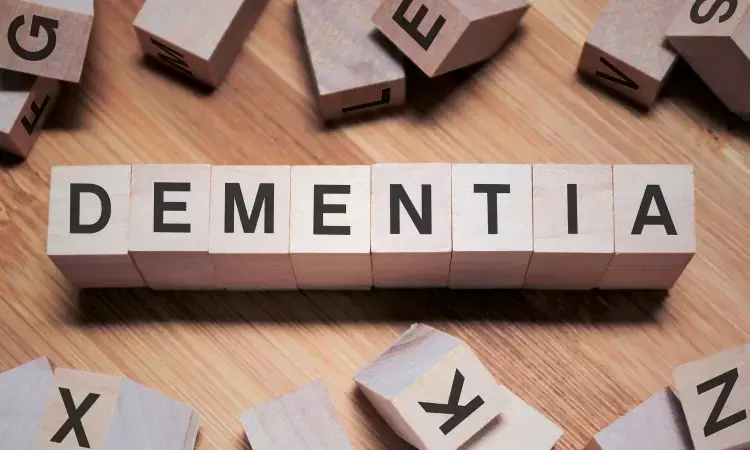- Home
- Medical news & Guidelines
- Anesthesiology
- Cardiology and CTVS
- Critical Care
- Dentistry
- Dermatology
- Diabetes and Endocrinology
- ENT
- Gastroenterology
- Medicine
- Nephrology
- Neurology
- Obstretics-Gynaecology
- Oncology
- Ophthalmology
- Orthopaedics
- Pediatrics-Neonatology
- Psychiatry
- Pulmonology
- Radiology
- Surgery
- Urology
- Laboratory Medicine
- Diet
- Nursing
- Paramedical
- Physiotherapy
- Health news
- Fact Check
- Bone Health Fact Check
- Brain Health Fact Check
- Cancer Related Fact Check
- Child Care Fact Check
- Dental and oral health fact check
- Diabetes and metabolic health fact check
- Diet and Nutrition Fact Check
- Eye and ENT Care Fact Check
- Fitness fact check
- Gut health fact check
- Heart health fact check
- Kidney health fact check
- Medical education fact check
- Men's health fact check
- Respiratory fact check
- Skin and hair care fact check
- Vaccine and Immunization fact check
- Women's health fact check
- AYUSH
- State News
- Andaman and Nicobar Islands
- Andhra Pradesh
- Arunachal Pradesh
- Assam
- Bihar
- Chandigarh
- Chattisgarh
- Dadra and Nagar Haveli
- Daman and Diu
- Delhi
- Goa
- Gujarat
- Haryana
- Himachal Pradesh
- Jammu & Kashmir
- Jharkhand
- Karnataka
- Kerala
- Ladakh
- Lakshadweep
- Madhya Pradesh
- Maharashtra
- Manipur
- Meghalaya
- Mizoram
- Nagaland
- Odisha
- Puducherry
- Punjab
- Rajasthan
- Sikkim
- Tamil Nadu
- Telangana
- Tripura
- Uttar Pradesh
- Uttrakhand
- West Bengal
- Medical Education
- Industry
Sleep medications may raise dementia risk in Whites: Study

USA: A new study published in the Journal of Alzheimer's Disease has shown that frequent use of sleep medications is linked with increased dementia risk in White older adults. The type and quantity of the medication may explain the higher risk.
The researchers found that at 7.7%, whites were three times as likely as Blacks, at 2.7%, to take sleep medications often, five to 15 times a month, or almost always, 16 times a month daily. Whites were almost twice as likely to use benzodiazepines, like Halcion, Dalmane and Restoril, prescribed for chronic insomnia.
It follows previous work that shows Blacks have a higher likelihood than whites of developing Alzheimer’s, the most common type of dementia, and that they have different risk factors and disease manifestations.
In the study, approximately 3,000 older adults without dementia, who lived outside of nursing homes, were enrolled in the Health, Aging and Body Composition study and followed over an average duration of nine years. Their average age was 74; 42% were Black, and 58% were white.
During the study, 20% developed dementia. White participants who “often” or “almost always” took sleep medications had a 79% higher chance of developing dementia compared to those who “never” or “rarely” used them. Among Black participants-whose, whose consumption of sleep aids was markedly lower-frequent users had a similar likelihood of developing dementia than those who abstained or rarely used the medications.
Higher-Income Blacks May Be Less Likely to Get Dementia
“Differences may be attributed to socioeconomic status” said first author Yue Leng, PhD, of the UCSF Department of Psychiatry and Behavioral Sciences and Weill Institute for Neurosciences. “Black participants who have access to sleep medications might be a select group with high socio-economic status and, thus, greater cognitive reserve, making them less susceptible to dementia.
“It’s also possible that some sleep medications were associated with a higher risk of dementia than others.”
Whites were also ten times as likely to take trazodone, an antidepressant known by the trade names of Desyrel and Oleptro, which may also be prescribed as a sleep aid. And they were more than seven times as likely to take “Z-drugs,” such as Ambien, a so-called sedative-hypnotic.
While the future study may offer clarity on the cognitive risks or rewards of sleep medications and the role that race may play, patients with poor sleep should hesitate before considering medications, according to Leng.
“The first step is determining what kind of sleep issues patients deal with. A sleep test may be required if sleep apnea is a possibility,” she said. “If insomnia is diagnosed, cognitive behavioral therapy for insomnia (CBT-i) is the first-line treatment. Melatonin might be a safer option if medication is to be used, but we need more evidence to understand its long-term impact on health.”
Reference:
Leng, Yue, Stone, Katie L., and Yaffe, Kristine. ‘Race Differences in the Association Between Sleep Medication Use and Risk of Dementia’. 1 Jan. 2023 : 1133 – 1139.
Dr Kamal Kant Kohli-MBBS, DTCD- a chest specialist with more than 30 years of practice and a flair for writing clinical articles, Dr Kamal Kant Kohli joined Medical Dialogues as a Chief Editor of Medical News. Besides writing articles, as an editor, he proofreads and verifies all the medical content published on Medical Dialogues including those coming from journals, studies,medical conferences,guidelines etc. Email: drkohli@medicaldialogues.in. Contact no. 011-43720751


